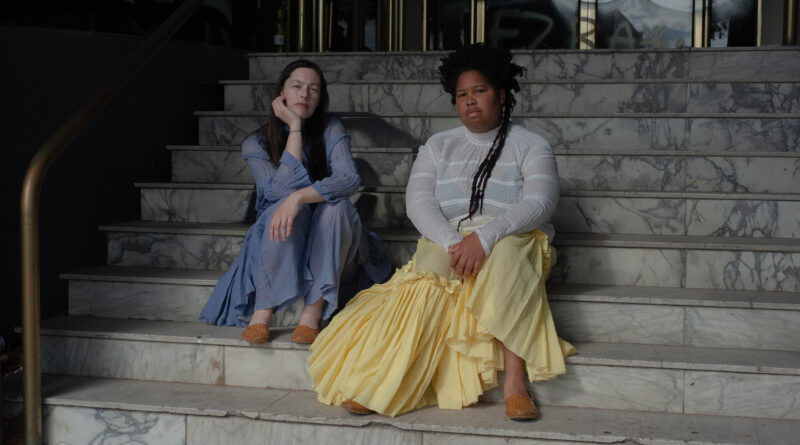Divide And Dissolve: The World Is Open To Change
Gas Lit, the latest album by Australian instrumental duo DIVIDE AND DISSOLVE, released at the start of the year to acclaim both from critics and listeners. Expanding on the crushing drone/doom of their previous releases, Takiaya Reed and Sylvie Nehill have continued to advocate for an end to colonialism, white supremacy and capitalism through their music.
“Our music is about acknowledging the unacknowledged,” says Reed, speaking from San Francisco where they have resided since the start of the COVID-19 pandemic. “It’s about making space for that emotion and giving a voice to people and cultures who historically haven’t had one.”
It’s a clear aim, even if the music can be dense and unforgiving for the uninitiated. Where many would relent and offer a clear lyrical through-line to guide the listener, DIVIDE AND DISSOLVE prefer the freedom of the soundscapes they create. It’s not just an artistic decision either. “There’s data that shows that most communication is done without a universal language. By not relying on language to create our music, it means that there are no barriers to our message, or to the enjoyment of it.”
Reed goes on to explain that the writing and recording process with Nehill has grown throughout the six years they have worked as DIVIDE AND DISSOLVE. “Collaboration is so important. We’ve grown as people and musicians and surrounded ourselves with people who understand our aims. Ruban Nielson [UNKNOWN MORTAL ORCHESTRA, who produced Gas Lit] knew exactly what sound we wanted and was completely in sync with us.”
That sound is a mix of thunderous drumming, heavily distorted guitar and saxophone riffs and walls of distortion. It’s clearly coordinated and yet carries an improvisational sound, with Reed and Nehill bouncing off one another to keep pushing their sound forward. “It’s not improvised,” Reed is direct on that point. “But when we are creating these tracks, we can feel when something is right. When we’re supposed to push harder or pull back and give the song time to breath. We’re so in tune with each other that we could stand back-to-back and know exactly what the other is about to do.”
Carefully chosen collaborators include MINORI SANCHIZ-FUNG who provides another piece of observant, socially conscious spoken word for the track Did You Have Something To Do With It. Having worked with the band on earlier albums Basic and Abomination, they understand the themes and creates a piece that encapsulates the whole album. “They have this inherent connection to words, and I am so grateful to count them as a friend,” Reed says. “I met them at a poetry event in Brooklyn a long time ago and felt this instant connection. I know Sylvie felt it too when they met. It’s such an interesting thing to continue to explore.”
In the same way that the compositions come from an emotional core of the two key players, DIVIDE AND DISSOLVE’s genre was not set in stone from the offset, but instead figured out as the two put their political and humanitarian believes into the music. “I’d never listened to metal before but when you look at the themes. At what we’re aiming to bring an end to – the mistreatment of indigenous peoples and the end of genocide – then what else was there but heavy metal? It was such a natural conclusion,” Reed explains. “Perhaps in a better world, we would be playing something different. I’d love to explore other genres but the time isn’t right for that.”
As mentioned in the review for Gas Lit, these themes are complemented by the music videos, which aid the listener, along with the mass of material produced by the band, to examine what DIVIDE AND DISSOLVE stand for. Case in point, the excellent but unsettling video for We Are Really Worried About You.
“We’re keen to explore our themes and get our message across on a multitude of platforms. It’s all part of our collaborative nature. We play music. We don’t direct or produce films or videos,” Reed says. “The only thing we wanted to ensure was indigenous people, people of colour and women were in charge of directing us. We’re so grateful that these talented individuals took part in creating something for us and it’s always interesting hearing the different interpretations of our work.”
With the ebb and flow of their music, the shift from light to dark and the constant background fuzz of distortion and electronics, it’s not hard to picture DIVIDE AND DISSOLVE soundtracking a feature-length film. “That would be incredible, and something we would be very open to!”
Perhaps it’s a naïve question but its one that should be asked. Are things getting better? Could the next DIVIDE AND DISSOLVE album be mellower because of a changing society? “I believe things are changing but I’m unsure if the world is getting better,” Reed says. “There are more conversations happening that would have been unthinkable in the past. People are paying more attention to those with privilege and power. With that said we are seeing different, more insidious methods of oppression coming forward. Look at the pandemic. Certain people have been allowed to work in the safety of their own homes, while others must risk their lives, and the lives of their families, to continue earning a wage. It’s a form of modern-day slavery. We’re certainly capable of more change.”
Perhaps we’re a long way off from a DIVIDE AND DISSOLVE pop album then – an idea Reed seemed to adore – but they end the interview on a positive note. “People have so much hope and joy in their hearts. The world is open to change. And once we can tour again and see all of the people who appreciate our music, it’s going to be so much fun. It’s what makes the most sense to me.”
Gas Lit is out now via Invada.
Like DIVIDE AND DISSOLVE on Facebook.

